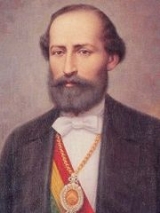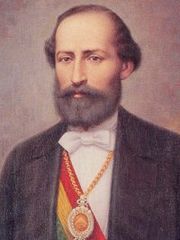
Adolfo Ballivián
Encyclopedia

Bolivia
Bolivia officially known as Plurinational State of Bolivia , is a landlocked country in central South America. It is the poorest country in South America...
between 1873 and 1874.
Born in La Paz
La Paz
Nuestra Señora de La Paz is the administrative capital of Bolivia, as well as the departmental capital of the La Paz Department, and the second largest city in the country after Santa Cruz de la Sierra...
, Adolfo Ballivián was the son of former Bolivian President and war hero José Ballivián
José Ballivián
José Ballivián was a Bolivian general during the Peruvian-Bolivian War and the 11th president of Bolivia from September 27, 1841 to December 23, 1847.-Biography:...
. Widely traveled, he was a member of the armed forces, orator, composer, writer, and congressman. Having joined the army at the age of 16, he combatted under the command of his father against insurgent forces. Nonetheless, he was forced to flee Bolivia
Bolivia
Bolivia officially known as Plurinational State of Bolivia , is a landlocked country in central South America. It is the poorest country in South America...
and lived abroad since 1847, when his father was toppled from power and exiled, first to Chile
Chile
Chile ,officially the Republic of Chile , is a country in South America occupying a long, narrow coastal strip between the Andes mountains to the east and the Pacific Ocean to the west. It borders Peru to the north, Bolivia to the northeast, Argentina to the east, and the Drake Passage in the far...
and then to Rio de Janeiro
Rio de Janeiro
Rio de Janeiro , commonly referred to simply as Rio, is the capital city of the State of Rio de Janeiro, the second largest city of Brazil, and the third largest metropolitan area and agglomeration in South America, boasting approximately 6.3 million people within the city proper, making it the 6th...
, Brazil. While traveling in Valparaíso, Chile, he met and married Carmen Grimwood Allende, of Quillota, Chile. Following his father's unexpected death in Brazil in 1855, Ballivián Coll returned to his native land. At first he attempted to rejoin the army and rose to the rank of Liutenant Colonel. Discouraged from continuing a military career (many mistrusted him for his obvious charisma, education, and potential to become a rival in an era of military supremacy in politics), he was persuaded to run for Congress instead. There he first shone as a brilliant orator and gifted defender of constitutionalism and the rule of law. He also became a part-time journalist.
Adolfo Ballivián chose to absent himself again when in 1872 the president, General Agustín Morales
Agustín Morales
Pedro Agustín Morales Hernández was a military officer and de facto President of Bolivia between 1871 and 1872....
, began to quarrel with the legislative and the media and hinted that he (Morales) may arrogate to himself supreme dictatorial powers. Ballivián was still in Europe when Congress and the Constitutionalist forces invoked his name as their official candidate in the 1873 elections, called hastily upon the assassination of President Morales. To his surprise, he was elected President overwhelmingly in what were possibly the cleanest elections up to that point in Bolivian history. Returning to Bolivia, he was sworn-in and presented with the presidential sash by his predecessor, Tomás Frías Ametller
Tomás Frías Ametller
Tomás Frías Ametller was a noted politician who served twice as president of Bolivia . Tomás Frías Province is named after him....
, on May 9, 1873. At that point Ballivián became the youngest Bolivian President to date, having followed precisely the oldest (Frías).
The young chief executive benefited from a short "honeymoon" period and then faced the customary obdurate, obstructionist opposition of factionalist politicians. It did not help that his short term in office coincided with a global fall in the price of silver, hitherto Bolivia's most important export alongside tin. It was in this context that Congress denied Ballivián's urgent request to buy new warships from Europe in order to re-equip the fledgeling, almost non-existent Bolivian Navy
Bolivian Navy
The Bolivian Naval Force , formerly known as the Bolivian Navy is a branch of the Bolivian Armed Forces. As of 2008, the Bolivian Naval Force had approximately 5,000 personnel...
, in view of mounting challenges to Bolivian sovereignty in the Pacific by Chile. This congressional denial would be rued by Bolivians in subsequent years, when war finally erupted. Still, Ballivián managed to rule in a rational and enlightened manner, above all adhering to democratic precepts, evincing a strict respect for the rule of law, and allowing full personal freedoms and the operation of an unfettered press.
Tragically, President Adolfo Ballivián was stricken with stomach cancer
Stomach cancer
Gastric cancer, commonly referred to as stomach cancer, can develop in any part of the stomach and may spread throughout the stomach and to other organs; particularly the esophagus, lungs, lymph nodes, and the liver...
within months of coming to power, and died at the age of 43 on February 14, 1874. He was constitutionally succeeded by Dr. Tomás Frías
Tomás Frías Ametller
Tomás Frías Ametller was a noted politician who served twice as president of Bolivia . Tomás Frías Province is named after him....
, the same man who had transferred power to him only 9 months earlier.
Grimwood, the paternal surname of Adolfo Ballivián's wife, and maternal surname of their children, is often misspelled Greenwood in genealogical resources such as FamilySearch.org

